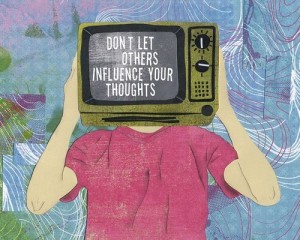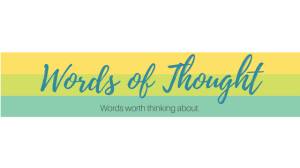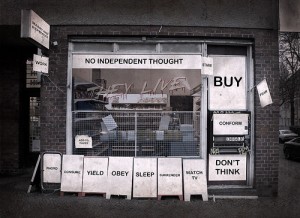Is any thought or opinion we have about the world truly our own?
The world is such an enormously huge space, and yet, it’s not really that ‘enormous’ anymore. Things that happen in places as far as Japan, America or Libya are reported to us within hours, or minutes, of its happening, without us ever truly being witness to it ourselves. We never see the fighting and killing that happen in Palestine, except for what is shown to us on our television screens; we didn’t see the bombings that happened in America on September 11, 2001 — except for the images that were played and replayed for us on our television screens. Most times, all we ever see of the world outside of our tiny South African ‘world’, is shown to us through the media, whether it be the news channels on TV, news websites on the internet or the old-fashioned newspapers. The fact remains, we didn’t see it ourselves.
One may argue, however, that seeing the events on TV — in which case a news reporter or video man is witness to it in real-time, and we are, therefore, witnessing the events vicariously through them — counts as us witnessing it for ourselves, too. No, it does not. What we see of what is happening in Egypt or China while we are sitting on our couches, in our living room, in our home in Cape Town, is only what the news reporters/video men want us to see, what they allow us to see.
The same applies for written news — they (the news reporters) only report what they deem worthy to be reported, and from their point of view. Hence, our opinion of any given news event that happens in the world is very likely not our own; rather, we are conditioned (to some degree) into a particular way of thinking and perceiving the world.
In essence, our consensus with what the media tells us of the world is constructed by how they choose to tell the news to us: what type of language they use (i.e. what words they use); what type of images they use; which story they choose to report and which not, etc. As bleak a view as this may be, and as much as many of us may want to deny it, we are conditioned to agree with what the media tells us. To some extent, yes, we do choose for ourselves what to believe, but is it ever truly void of what the media has allowed us to know?
Chuck Palahnuik writes in his novel, Invisible Monsters:
Nothing of me is original. I am the combined effort of everybody I’ve ever known.
These words bear undeniable truth, and it extends further than just the people we’ve met in our lives; it reaches to the news channels we have dinner with, and the newspapers and news websites we rendezvous with throughout our day.
Let’s look at an article that appeared on the IOL website on The Sunday Independent page, I hate myself and my mouth, says Scott, which is a report about former Jacaranda 94.2 radio DJ and SuperSport rugby commentator, Darren Scott, who made a racist remark to his black colleague, calling him the k-word. Subsequently, Scott resigned from the radio station and was fired from the SuperSport channel. In the afore-mentioned article, the media attempts to construct our opinion of Scott from the get-go by using a self-deprecating quote from Scott himself as the title of the article. Through this, we are already told that Scott regrets his words and that he is not proud of himself, which suggests that readers should sympathise with him, rather than hold him to trial. The entire article is basically a sum-up of Scott’s side of the story, an opportunity given to him by the media to state his case so that he isn’t just painted as the ‘white, closet racist who just got exposed’, as many other media have done.
So, bearing in mind that this seems to be the primary aim of this article, it is noticed that the larger part of the article is made up of Scott’s comments about the incident. He says things like:
- “I don’t think I’ve ever had a day when I’ve disliked myself as I do now.”
- “I’ve got to seriously think if there’s something inside me that harbours some form of racism…”
- “I don’t like myself for saying it.”
- “…my own stupidity”
- “I just want to get to a point where I feel better about myself.”
- “This has been incredibly difficult.”
Scott is depicted as a man at war with himself, a man who is his own judge, so that others wouldn’t have to be. We see Scott as an innocent, normal person (as opposed to the guilty, ‘not normal’ racist he has been depicted to be) just having a bad day, as the writer says, “Scott rubs his face and eyes and sips strong coffee.” And we are told of the difficulty that Scott is enduring through all of this, with the writer’s very evidently biased comment: “He looks tired and the strain is evident.” There is little room left by the writer for the reader to have any animosity against Scott, the reader has little other choice than to feel sorry for him. This is further emphasised by the repetitive statement of apology, with the writer saying at two separate points in the article that Scott “apologised”, and that “Scott knows he messed up”, as though he is a child who has been caught doing something naughty and is being reprimanded. In an attempt to lighten his punishment, the child admits his error, in the hope to soften up the one who will punish him, which in Scott’s case is the entire South African community.
Whether this attempt has worked on the article’s readership is unknown to me, but to speak for myself, I am honestly unsure of whether to feel sorry for him or not. The very first media that had reached me of this particular incident was of a nature in total contradiction to the one that I cite here. The first media response to Scott’s ‘racist’ comment was a radio talk show that had immediately, without sympathy, condemned him as a racist. So this, too, has played its part in constructing my opinion of the news, and, as a consequence, I have two warring views about the same incident, and my mind doesn’t know which one to allow to ‘brainwash’ it.
 So, with all that being said, we see that there is little that we think of the world today, little that we know of the world, that is not influenced by the media. The influence of the media is far-reaching and, try as we might, if we read newspapers and watch news channels, there is little that we can do but accept what they tell us. We can argue and debate various news topics, disagreeing with certain media’s views about various topics, but ultimately, our disagreement of it is also only a result of an opinion or belief that was shaped by some other form of the media.
So, with all that being said, we see that there is little that we think of the world today, little that we know of the world, that is not influenced by the media. The influence of the media is far-reaching and, try as we might, if we read newspapers and watch news channels, there is little that we can do but accept what they tell us. We can argue and debate various news topics, disagreeing with certain media’s views about various topics, but ultimately, our disagreement of it is also only a result of an opinion or belief that was shaped by some other form of the media.
_________________________



yoh, i finally got to the conclusion! So basically we’re a buncha opinionless beings not equipped to use our heads.
Is that a question or a statement? If you’re asking me, then, no, I wouldn’t say that. We do indeed have our own opinions on matters, but the views and inherent bias of the media clouds our opinions so that it’s difficult for us to distinguish between the two. But as for the part of us not being equipped to use our heads — yes, I agree, we’ve become too used to the media telling us what to know and what to believe.
And, seriously, it’s not THAT long…
It is seriously that long. But a good read.